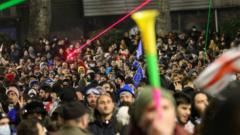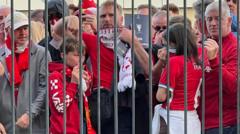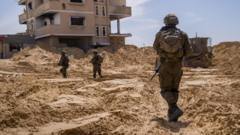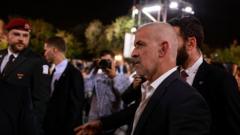As protests continue in Tbilisi and other Georgian cities against the government's EU accession decision, tensions escalate with claims of a "stolen" election fueling public outcry and calls for fresh democracy.
Georgia's Turmoil: Protests Erupt Against Halting EU Accession Talks

Georgia's Turmoil: Protests Erupt Against Halting EU Accession Talks
Tensions rise in Georgia as citizens take to the streets for a third consecutive night in response to a government decision to postpone EU negotiations.
Thousands of Georgians are filling the streets for a third night, demonstrating against the government's choice to suspend negotiations for European Union accession. Riot police have been deployed in large numbers around the parliament building, which has become the center for protests that have seen the use of water cannon and tear gas against demonstrators. Other regions, including Batumi, Kutaisi, and Zugdidi, are also witnessing similar demonstrations.
President Salome Zourabichvili, a pro-EU figure, declared to the BBC that she would continue her presidency until new parliamentary elections occur, despite a newly-elected parliament's intention to appoint a successor on December 14. She has voiced her belief that the current parliament lacks legitimacy, especially after opposition members cited fraud in the recent elections. A considerable number of civil servants and ambassadors from Bulgaria, the Netherlands, and Italy have resigned in protest against halting the EU negotiations, asserting the decision contradicts Georgia's national interests.
Since 2012, Georgia has been under the governance of the Georgian Dream party, viewed by critics as steering the country away from the EU and towards closer ties with Russia. Following the European Parliament's resolution criticizing the recent elections as a sign of Georgia's deepening democratic crisis, Prime Minister Irakli Kobakhidze disclosed that discussions on EU membership would remain off the agenda until late 2028.
A coalition of public figures, writers, and journalists has been organizing protests outside the public broadcaster, accusing it of being biased in favor of the ruling party. Activist Lasha Bugadze emphasized the need to liberate the broadcaster from outside influences and propaganda. In response to the protests and concerns over election legitimacy, four opposition party coalitions, which declined their parliamentary seats due to alleged vote rigging, have called for new elections under international supervision.
The U.S. government criticized the excessive force used against protesters and urged all involved parties to maintain peace during demonstrations, acknowledging that the Georgian populace largely supports European integration. As tensions boil, approximately 150 demonstrators faced detainment amid violent clashes on November 29. Prime Minister Kobakhidze reported injuries among police officers due to confrontations with protesters armed with Molotov cocktails and other projectiles, and he condemned European leadership for their criticism of his government.



















